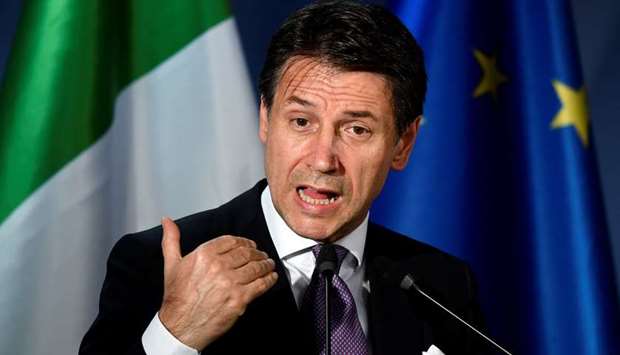Italy banned domestic travel and shut down a range of industries yesterday in a last-ditch push against the spread of a coronavirus, which causes the Covid-19 disease that has killed nearly 5,500 people in a month.
The wave of restrictions is designed to ensure that Italy gets through a 10-day stretch in which the rate of deaths and infections is supposed to finally drop.
“Everyone’s effort is needed,” Prime Minister Giuseppe Conte told reporters. “The country’s social and economic strength is at stake.”
Italian health officials reported that the rate of increase in both deaths and declared infections slowed on Sunday – albeit from a high base.
There were 651 fatalities on Sunday compared with Saturday’s record 793 deaths, while the number of new reported infections fell to 5,560 from 6,557.
However, Conte told Italians that it is too early to let down their guard.
“We have not reached the most acute phase of the infection and the numbers will continue to grow,” he said. “Much depends on the responsible behaviour of each one of us.”
Conte’s latest order comes after he caused confusion on Saturday by ordering all “non-essential” factories and trades to shut until April 3.
The government released a long list of industries and professions that would still be allowed – including translation services and computer repair shops.
Auto part makers were allowed to stay open but steel mills were shut.
Newsstands were allowed to stay open but book stores were not.
Italians frustrated with the ever-changing regulations began to parody officials on social media who had released video messages threatening to jail joggers and fine people walking their dogs too far from their house.
The decrees published yesterday added to an air of confusion in the face of a disease that Conte has called Italy’s biggest threat since World War II.
They include a separate instruction forbidding Italians “from moving by public or private means of transport outside the municipality in which they are currently located”.
There is an exception for people who can prove they must travel “for work needs of absolute urgency or for health reasons”.
The reality is that Conte’s team is running out of things to close or ban.
Ministers and health experts are all looking at the daily death toll and infection rates to see if their approach has worked.
They pleaded with Italians to sacrifice individual liberties for the common good for two weeks.
The initial restrictions placed on Lombardy – the northern region at the centre of the Italian epidemic that includes the financial capital Milan – expired on Sunday and the national measures are set to end tomorrow.
Conte indicated last week that he might need to extend the restrictions indefinitely.
His decision is expected this week.
“If everyone – and I stress everyone – respects our bans, we will emerge from this very difficult test first,” Conte said yesterday.
Meanwhile, Spain has reported that there are nearly 4,000 healthcare workers infected with the coronavirus, more than one in ten of total confirmed cases, as the virus toll rose in Europe’s second-worst affected country.
Like in other countries hit hard by the virus, nurses, doctors and other healthcare workers have said they are not getting enough protective kits.
Authorities and companies are scrambling to manufacture, buy and distribute more of them.
“We have some data we do not like, because we should try to control it, such as having 3,910 health workers affected,” health emergency chief Fernando Simon told a news conference.
The number of cases registered in Spain rose to 33,089 up from 28,572 cases on Sunday.
This means healthcare workers account for nearly 12% of the total.
They and nursing home staff will have priority as Spain rolls out a testing programme.
The coronavirus death toll has reached 2,182, adding 462 fatalities overnight, the health ministry said.
Simon said that 87% of those who had died were aged 70 or older.
Deputy Prime Minister Carmen Calvo was hospitalised on Sunday with respiratory infection and is awaiting coronavirus test results, the government said yesterday.
Results for Calvo, born in 1957, will be released as soon as they are known, the statement said.
Two other ministers and the wife of Prime Minister Pedro Sanchez have also tested positive for the coronavirus over the past weeks.
With an extension to April 11 of a nationwide lockdown set to be approved by parliament tomorrow, Simon said that now is not the time for people to relax on respecting rules that ban anyone from leaving their home except to go to work, buy food or go to the pharmacy.
“On several occasions it has been said that the peak (of the epidemic) could be reached this week. Reaching the peak does not involve having controlled the problem, it means that you have to redouble your efforts not to take a step backwards,” Simon said.
Supermarket group Corte Ingles said it had set up a phone number and e-mail for healthcare workers to do their shopping, with free delivery to their homes.

Conte: We have not reached the most acute phase of the infection and the numbers will continue to grow. Much depends on the responsible behaviour of each one of us.
